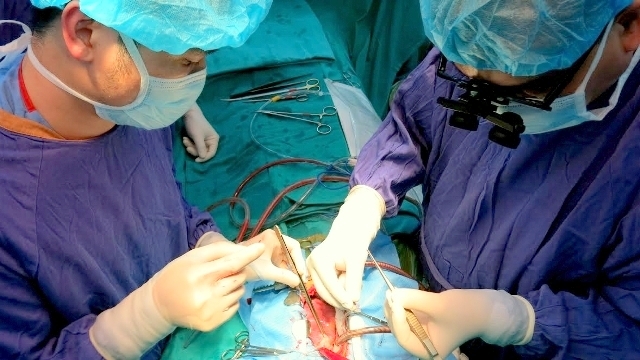Medical breakthroughs in organ transplantation and "regeneration" for many patients after liver, kidney and most recently a lung transplant surgery have been successfully conducted are the driving forces encouraging Vietnamese organ transplant experts to take on the difficult task of conducting limb, face, bowel and uterus transplants.

Doctors at the Hanoi-based Vietnam-Germany Friendship Hospital carry out a heart transplant on a young patient.
Prof., Dr. Trinh Hong Son, Deputy Director of Vietnam-Germany Friendship Hospital and Director of the National Coordination Centre for Organ Transplantation, said that as of May 31, 2017, the total number of organ transplants conducted in Vietnam has reached 2,425.
Among them, Vietnam has successfully performed 2,327 kidney transplants, 77 liver transplants, 18 heart transplants, one combined kidney and pancreas transplant, one combined heart and lung case and one lung transplant.
Proud of what the centre has carried out to mobilise support from the society, Prof. Son expressed that for humanitarian purposes, the number of registered organ donors has increased.
The total number of registered donors nationwide as of June 15, 2017 was 8,355. The total number of registered donors at the center is 167.
From an initial count of zero, the number of living organ donors now registered at the centre is at 65. Six of them conducted living organ donation.
From these successful cases, Prof. Son said that his team of transplant specialists are ready for new fields, such as limb, face, intestine and uterus transplants.
Women of the childbearing age who have had their uterus cut can in the near future have uterus transplants to restore their delivery function.
This is also considered a humanistic goal of the transplant sector, helping women achieve their natural motherhood.
Three further steps in the field of organ transplant confirmed by Son that will soon be implemented in Vietnam are limb, intestine and face transplants.
Face transplants are considered to be a simpler method, similar to facial shaping.
Intestinal transplants are faced with the problem of sourcing donated organs. At present, many patients have to undergo emergency gut cuts; doctors connect duodenum with colon, which causes the patient’s body after the intestinal cut to become very weak.
If they undergo only small intestine transplant, their health is able to recover much sooner.

Prof., Dr. Trinh Hong Son, Director of the National Coordination Centre for Organ Transplantation.
The most difficult aspect in limb transplantation is that implant sources can only come from donations of braindead persons.
Meanwhile, Vietnamese people always have the concept of full body burial, thus it is very difficult to mobilise family members of those who are technically braindead to donate their limbs.
However, experts said there is no technical concern because in reality there have been many autografts conducted for those who broke their limbs with very high success rates.
After the success of a lung transplant conducted on a child patient from a living donor, next September, doctors will conduct the first lung transplant on an adult, using an implant from a braindead donor, with the help of foreign experts.
"However, right now if there is a donated lung, we are also ready to carry out the transplant without the help from international experts. All preparations have been made, post-lung graft care has also been planned," said Prof. Son.
However, according to Son, lung transplants in Vietnam still face a range of difficulties. Patients with lung diseases need help with breathing, while it is not easy to convince them to undergo lung transplants, not to mention that a lung transplant is the most susceptible organ transplantation and post-transplant resuscitation is also extremely challenging.
Among organ transplant cases in Vietnam, kidney transplants are now routinely performed. At the Vietnam-Germany Friendship Hospital, doctors carry out 2-6 kidney transplants a week, with transplanted kidneys primarily sourced from living donors.
According to Son, every day there are from one to five people who are pronounced braindead. If these individuals agree to donate their organs, transplants will save a lot of lives.
“We wish that the health sector will facilitate its campaigns with joint hands from the media to raise public awareness on the meaning of organ donation and encourage society to register for organ donation for humanitarian purposes,” he added.
Nhan Dan